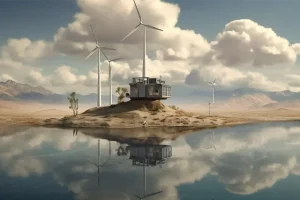
Sridhar Narayan posits that the climate sector presents an investment opportunity of more than $1 trillion in South Asia. The United Nations (as of Saturday, September 9, 2023) estimates that Southern Asia has a population of 2,031,725,031 (equivalent to 25.2% of the total world population). This should stir up any entrepreneur thinking about sustainability. Indeed, it is a world of green technology startups and entrepreneurship, where innovation drives sustainable development. In an era when our planet is facing pressing environmental challenges, startups must rise to the occasion by developing groundbreaking solutions that not only drive economic growth but also protect our natural resources. From renewable energy sources to waste management systems, our world needs more green technology startups to address issues across the globe.
But what exactly defines a green technology startup? Why are they so important in today’s world? And how can entrepreneurs successfully launch their own sustainable ventures? We will explore the exciting realm of green technology startups and uncover the key factors for success.
Green technology startups, also known as CleanTech startups, are companies that focus on developing and implementing innovative solutions to address environmental challenges. These startups leverage technology and innovation to create sustainable alternatives in various sectors such as energy, transportation, agriculture, waste management, and more.
What sets green technology startups apart is their commitment to reducing carbon footprints and promoting ecological sustainability. They strive to minimize negative impacts on the environment while maximizing positive outcomes for both society and the economy.
These startups often rely on cutting-edge technologies like renewable energy sources (such as solar or wind power), smart grid systems, energy-efficient appliances, electric vehicles, sustainable packaging materials, and water purification systems – just to name a few. By harnessing these technological advancements in inventive ways, green technology startups aim to create a cleaner and greener future for all.
In addition to these areas mentioned above, other sectors like agriculture, waste management, and construction will continue to benefit from innovative green solutions.
For example, we may see increased adoption of vertical farming techniques to maximize food production.
Similarly, advanced recycling technologies could help transform waste into valuable resources. Eco-friendly building materials may become more widely used
in construction projects.
All these developments point towards an exciting future where sustainability becomes ingrained in every aspect of our lives. Green technology startups will play a crucial role in driving this transformation by bringing new ideas to market and disrupting traditional industries.
While uncertainties remain regarding funding challenges or regulatory hurdles, there’s no doubt that the future of green technology is bright and filled with
In conclusion, in today’s rapidly changing world, green technology startups play a crucial role in driving innovation and sustainability. These forward-thinking entrepreneurs are not only tackling environmental challenges but also creating lucrative business opportunities.
Green technology startups are important because they provide solutions to pressing environmental issues such as climate change, pollution, and resource depletion. By developing new technologies and practices that promote energy efficiency, renewable energy sources, waste reduction, and sustainable agriculture, these startups contribute to a more sustainable future for our planet.
The benefits of green technology startups are far-reaching. Not only do they help reduce carbon emissions and conserve natural resources, but they also create jobs and stimulate economic growth. Additionally, these startups have the potential to disrupt traditional industries by offering cost-effective alternatives that are both environmentally friendly and financially viable.
However, it is important to acknowledge the risks associated with launching a green technology startup. The initial costs can be high due to research and development expenses as well as regulatory hurdles. Also, market adoption may take time as consumers need to be educated about the benefits of these innovative products or services.
To successfully launch a green technology startup requires careful planning and execution:
- Identify an environmental problem: Start by identifying a specific problem or challenge that you want your startup to address. Conduct thorough market research to ensure there is demand for your solution.
2. Develop an innovative solution: Use your expertise in science or engineering to develop an innovative product or service that offers ecological advantages over existing alternatives.
3. Secure funding: Seek out investors who share your vision of sustainability or explore government grants specifically designed for green initiatives.
4. Build strategic partnerships: Collaborate with other organizations or individuals who can complement your strengths and help accelerate the growth of your startup.
5. Market effectively: Educate consumers about the environmental benefits of your product or service through targeted marketing campaigns focused on sustainability messaging.
6. Scale up sustainably: As your startup grows, continue prioritizing sustainability. Implement eco-friendly practices within your operations and supply chain to minimize your environmental footprint.






